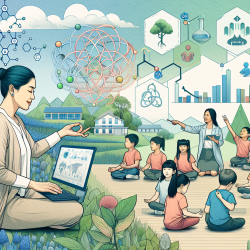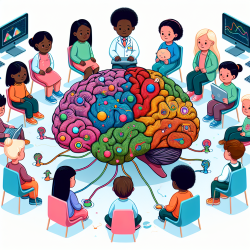Introduction
The COVID-19 pandemic has profoundly impacted the mental health of healthcare professionals globally. A recent study titled "Psychological Impact of the COVID-19 Pandemic on Dentists in Latin America’s Epicenter: São Paulo, Brazil" provides critical insights into the psychological challenges faced by dentists during the pandemic. While the study focuses on dentists, its findings are relevant to other healthcare professionals, including those in speech-language pathology. This blog post explores how practitioners can leverage these insights to improve their skills and outcomes in online therapy, particularly for children.
Understanding the Psychological Impact
The study surveyed 93,280 dentists in São Paulo, revealing significant stress and anxiety levels, especially among younger and male dentists. Dentists working in public health services and those with a COVID-19 high-risk status or a family member diagnosed with COVID-19 reported higher anxiety levels. These findings underscore the importance of addressing mental health concerns within healthcare settings.
Applying Insights to Online Therapy
For practitioners in online therapy, understanding these psychological impacts is crucial. Here are some actionable steps based on the study's findings:
- Recognize Stress and Anxiety: Be aware of the signs of stress and anxiety in yourself and your colleagues. Regular self-assessment and peer support can help mitigate these effects.
- Promote Mental Health Resources: Encourage access to mental health resources for both practitioners and clients. This includes counseling services and stress management workshops.
- Foster a Supportive Environment: Create a supportive online community where practitioners can share experiences and coping strategies.
- Adapt to Changing Needs: Be flexible and adapt your therapy approaches to meet the evolving needs of your clients, especially during times of crisis.
Encouraging Further Research
The study highlights the need for further research into the mental health impacts of pandemics on healthcare professionals. Practitioners can contribute by participating in studies, sharing their experiences, and advocating for more research in this area. This will help develop evidence-based strategies to support mental health in healthcare settings.
Conclusion
The COVID-19 pandemic has underscored the importance of mental health in healthcare. By applying the insights from the São Paulo study, practitioners in online therapy can enhance their skills and improve outcomes for children and other clients. Continued research and collaboration are essential to building resilient healthcare systems that prioritize mental health.
To read the original research paper, please follow this link: Psychological Impact of the COVID-19 Pandemic on Dentists in Latin America’s Epicenter: São Paulo, Brazil.










